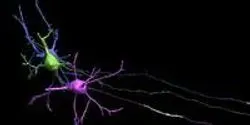Neuroscience

Lawrence Livermore National Laboratory recently received $5.6 million from the Department of Defense's Defense Advanced Research Projects Agency (DARPA) to develop an implantable neural interface with the ability to record and stimulate neurons within the brain for treating neuropsychiatric disorders.

Neuroscience and cancer research added to statewide priorities: about $61 million awarded to URI since program began in 2001. Brown University, Rhode Island College, Providence College, Bryant University, Roger Williams University, Salve Regina University and CCRI are partners in RI-INBRE program.

When it comes to the brain, wiring isn’t everything. Although neurobiologists often talk in electrical metaphors, the reality is that the brain is not nearly as simple as a series of wires and circuits. Unlike their copper counterparts, neurons can behave differently depending on the situation.

The University of Washington is receiving a $31.2 million gift from Washington Research Foundation to boost entrepreneurship and support research that tackles some of society’s most crucial challenges.

Leica Microsystems’ microscopes can now fully integrate with Neurolucida and Stereo Investigator software for analyzing cells in neuroscience research.

Scientists at the Salk Institute have created a new model of memory that explains how neurons retain select memories a few hours after an event.












